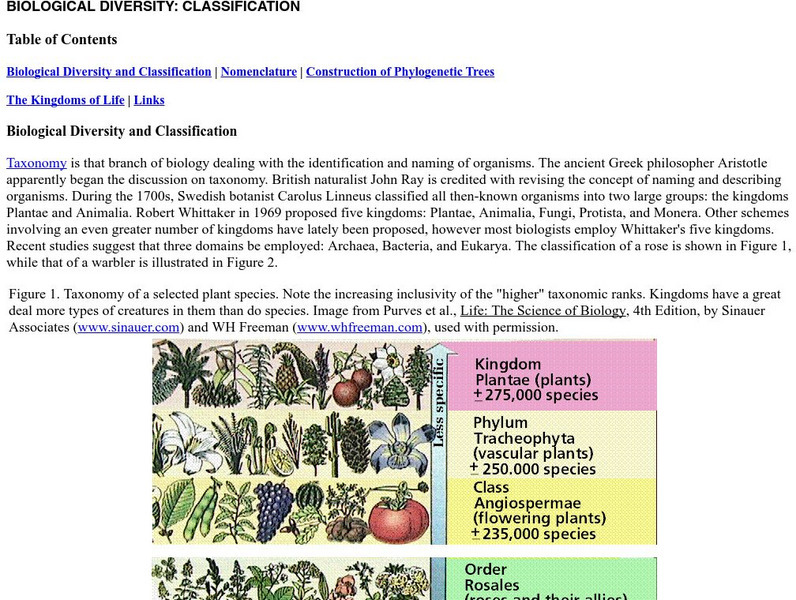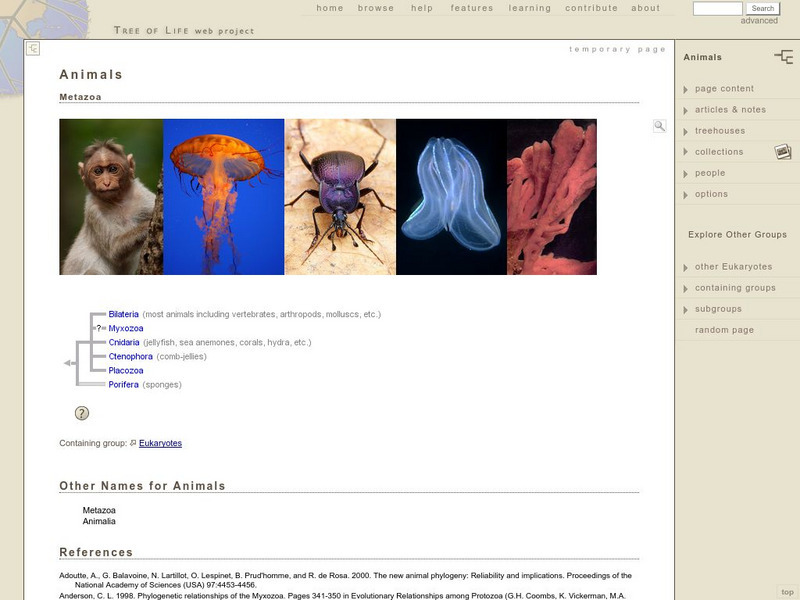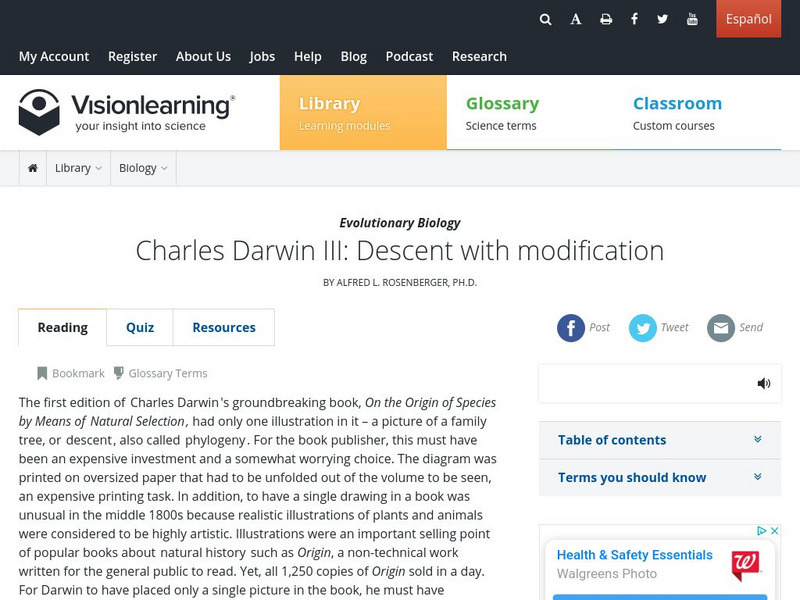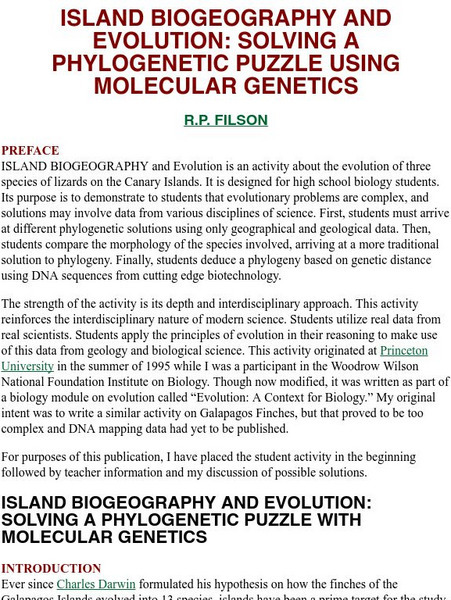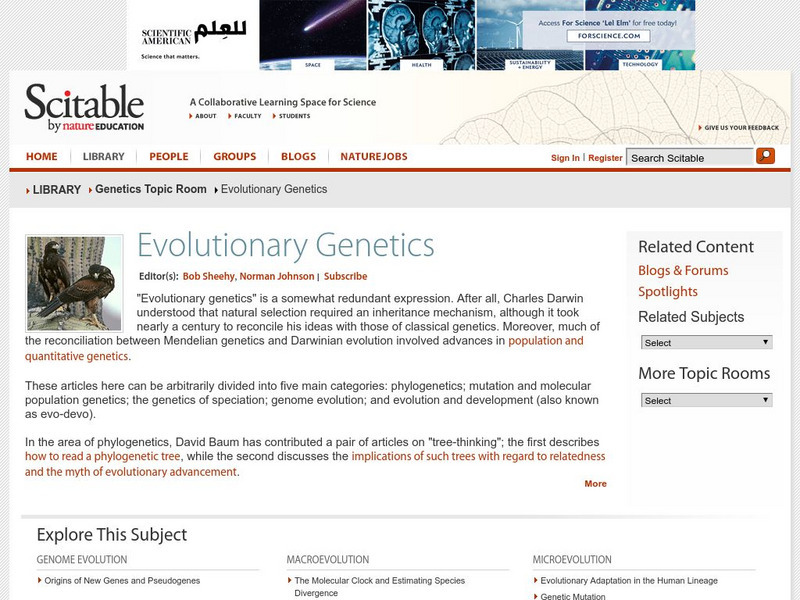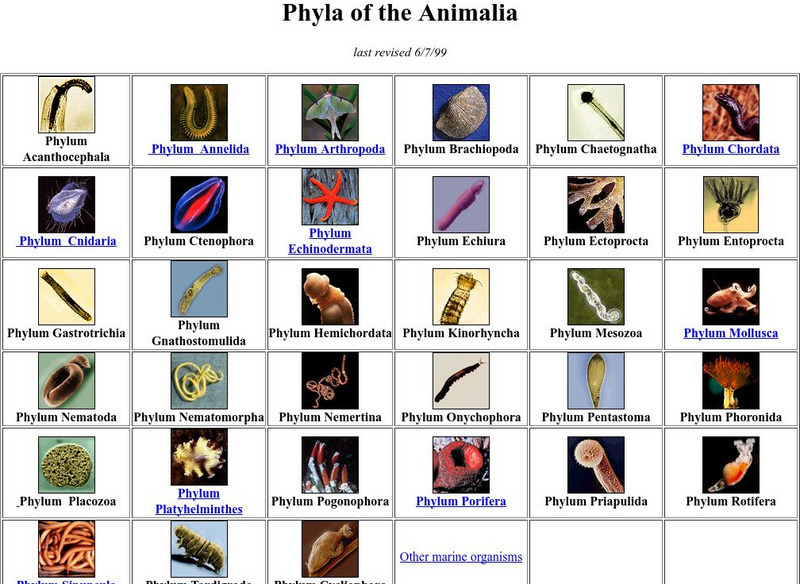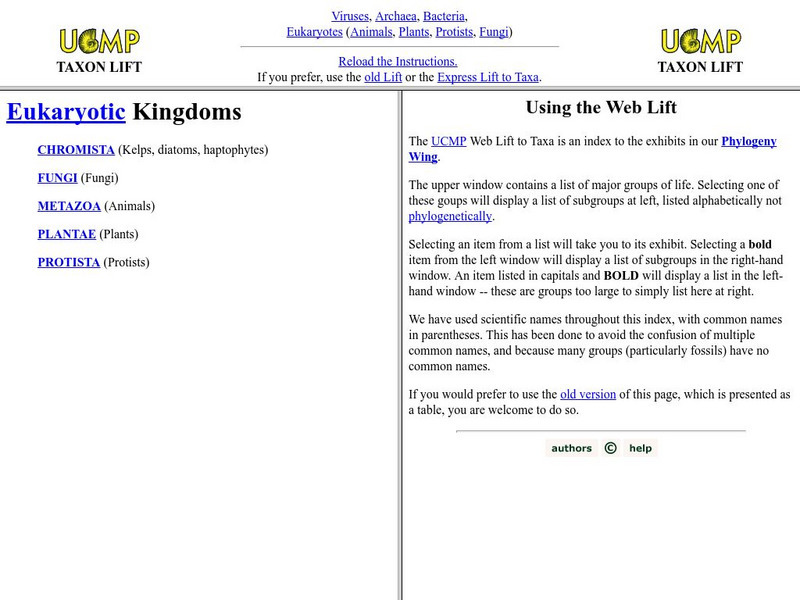Curated OER
Taxonomy
Students complete a short quiz reviewing classification. In groups, they create their own family trees and discuss who is related to whom and are introduced to phylogenies in genetics. To end the lesson, they take notes on Taxonomy and...
Curated OER
Plant Phylogeny
Students examine live potted plants and create a hypothesis regarding their relationships in this upper-level introductory lesson on phylogenetic reconstruction using morphological characters. The lesson can be accomplished in...
Curated OER
Anolis Lizards of the Greater Antilles
Students "take a trip" to the Greater Antilles to observethe Anolis lizards. They study the body structures and habitat of different species, then plot this data on a map to look for patterns in their distribution. From the patterns they...
City University of New York
Classification: Bringing Order Out of Chaos
A self-directed module on all aspects of biological classifications that covers the species problem, diversity and chaos, cladistics, putting things in groups, and so on.
Vision Learning
Visionlearning: Biology: Galapagos Finches
Interactive animation illustrates how Charles Darwin used his study of finch beaks to explain evolution. A phylogenetic tree diagram shows how the birds' color and beak shape changed over generations.
Estrella Mountain Community College
Estrella Mountain College: Classification
Discusses many aspects of information pertainingto organism classification. Provides links to other areas in biology as well.
American Institute of Biological Sciences
Action Bioscience: Malaria, Algae, Amoeba and You: Eukaryotic Relationships
Researchers are considering more recent findings of eukaryotes and their phylogeny. Investigate the insights to understand that there may be more progress found in determining the relationships to other eukaryotes.
Tree of Life Project
The Tree of Life Web Project: Animals
Extensive site that contains much information about the various animal phyla. Each phyla gives photos, common examples, scientific names and references. Collection of 1630 websites about bio-diversity.
Tree of Life Project
The Tree of Life Web Project
The Tree of Life Web Project contains information on living organisms including their history and characteristics. Over 3,000 web pages are linked together uniting all living things.
Vision Learning
Visionlearning: Biology: Charles Darwin Iii: Descent With Modification
Instructional module focusing on Charles Darwin's theory of Descent with Modification. Discusses how slight changes from parent to offspring create variation and potentially create new species over time. Site also includes an interactive...
University of California
Ucmp: Island Biogeography and Evolution
This is a lesson designed by a biology teacher. In it, students use maps and evidence of island age, molecular genetics, morphology, and distance apart to determine how the islands came to be occupied by different species of lizards. It...
Nature Research
Scitable: Evolutionary Genetics
A collection of articles on evolutionary genetics focusing on the topics of phylogenetics, mutation and molecular population genetics, the genetics of speciation, genome evolution, and evolution and development. Learn how to read a...
National Institutes of Health
National Center for Biotechnology Information: Phylogenetics Factsheet
A detailed website that explains the history and process of classifying animals using evolutionary, molecular, and physical characteristics relationships. Website also contains information on evolution and evolutionary processes....
Other
Marine Flatworms of the World!
This personal page provides a table of contents to everything one would want to know about marine flatworms. Includes photos, charts, references, and much more.
Miami University
Miami University: Nuts and Bolts of Classification
Discusses many aspects of taxonomy. Provides a lab activity where students are required to devise a classification scheme for nuts, bolts, and other hardware items.
University of California
Ucmp: Online Exhibits
Visit the virtual exhibits at this site to learn more about paleontology, the history of the earth, and life on earth. Use the information on this site to understand geology, geologic time, evolution, and phylogeny.
Columbia University
Columbia University: Phyla of the Animalia
Visual and textual information of the major animal phyla with a focus on marine organisms.
George Washington University
George Washington University: Basics of Cladistic Analysis [Pdf]
This is an advanced level review of cladistic theory and methodology. Some sections are very dense but there are useful sections for teachers and students seeking a better understanding of the topic.
Biology Corner
Biology Corner: Cladogram Analysis
A lesson plan where students analyze a cladogram to understand a derived characteristics between a group of organisms. After analyzing the prepared cladogram, students create their own.
University of California
Ucmp: Web Lift to Taxa
Alphabetical listing from the University of California of info on each of the animal phyla. Includes scientific and common names and photos. Characteristics of each group are explained in detail.
University of California
Ucmp: Introduction to Ctenophora
This is an advanced level review of the biology of these organisms. The opening photographs are worth seeing!
Estrella Mountain Community College
Online Biology Book: Biological Diversity: Classification
Explore the classification of living things in this online, college-level textbook. Learn about taxonomy and its history through diagrams and descriptive information.
Open Curriculum
Open Curriculum: Modern Classification Systems
Identify the four new kingdoms that were added to the original Linnaean taxonomy.
My Science Site
Middle School Science: Shoe Classification Lab [Pdf]
This concise worksheet site will enable students to learn how to create a classification system and to understand the reasons for classification in science. Requires Adobe Reader.







